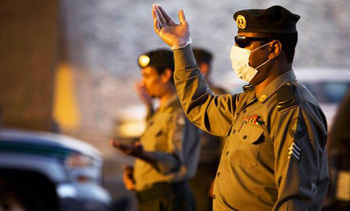Jeddah, SEP 25: The Traffic Department has sought the assistance of Tawafa organizations for the success of its plan for the Haj season this year.
 “Tawafa organizations are an important partner for the success of the Haj traffic plan,” said Maj. Gen. Abdul Rahman Al-Muqbil, director of traffic police and assistant commander of Haj security forces.
“Tawafa organizations are an important partner for the success of the Haj traffic plan,” said Maj. Gen. Abdul Rahman Al-Muqbil, director of traffic police and assistant commander of Haj security forces.
Addressing a meeting organized by the Tawafa Organization for Pilgrims from Arab Countries in Makkah, he explained the department’s plan for the Day of Arafat and the movement of pilgrims from Arafat to Muzdalifa, as well as for the various divisions of Mina.
“I take this opportunity to advise all Tawafa organizations to follow the traffic regulations, which have been set out for the safety and security of pilgrims,” Al-Muqbil said.
Brig. Mohammed Al-Buqami, head of the traffic command, said a large number of traffic officers would be deployed on the roads to ensure smooth flow of pilgrims from Arafat to Muzdalifa without traffic jams. Speaking at the meeting, Turki Al-Qurashi, head of the transport committee at Haj Ministry, urged Tawafa organizations to encourage their pilgrims to stay in Mina until 13 Dul Hijjah to avoid overcrowding at the circumambulation area around the Kaaba during Tawaf Al-Wida.
“It will also help reduce congestion at the central region of Makkah,” he said, adding that buses leaving Mina with pilgrims before 13 Dul Hijjah would be stopped.
Brig. Khaled Al-Dhubaib, commander of traffic in Arafat, disclosed plans to open the western, eastern, northern and southern ring roads on Dul Hijjah 8, allowing free movement of service vehicles.
“We will not allow any buses without pilgrims to enter Arafat,” the commander said. The parking area for the Tawafa organization for Arab pilgrims can accommodate 8,211 buses, he added.
Maj. Gen. Wasl Al-Harbi, commander of traffic for Muzdalifa, said there would not be any major change for the Haj plan except for the movement of vehicles on western King Faisal Bridge.





Comments
Add new comment